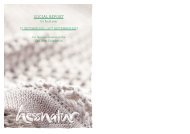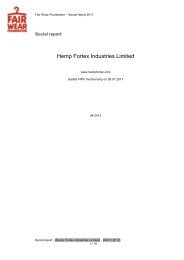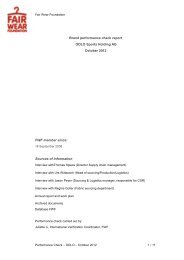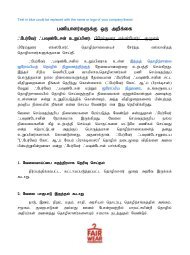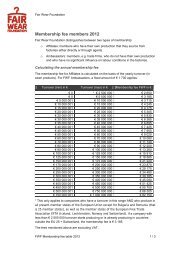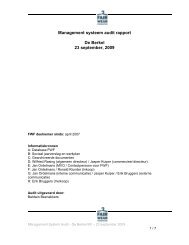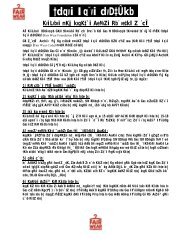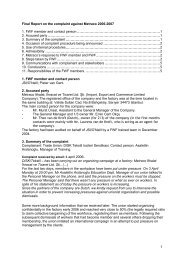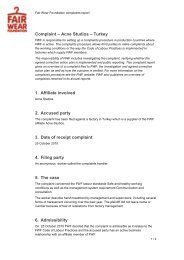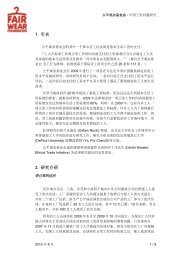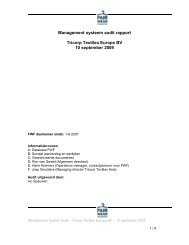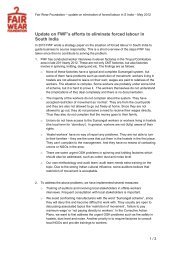Background Study Tirupur - Fair Wear Foundation
Background Study Tirupur - Fair Wear Foundation
Background Study Tirupur - Fair Wear Foundation
Create successful ePaper yourself
Turn your PDF publications into a flip-book with our unique Google optimized e-Paper software.
nitely. In the export unit and the merchandise units there may be workers<br />
mittees wherein they discuss their issues and try to settle the issues with the<br />
management amicably.<br />
The <strong>Tirupur</strong> wage settlement is the only accord available for the workers in Tamil<br />
Nadu. This covers only some parts of <strong>Tirupur</strong> region and the region itself is widened till the<br />
outskirts of Coimbatore City where it is not applicable. There is no such agreement in other<br />
parts or regions of India like this accord. This settlement is not covering the workers in dyeing<br />
and bleaching units, fabric-printing units, calending units and spinning mills.<br />
Many workers do not realise what their rights are. This concerns the right to join unions but<br />
also for instance rights in regard to PF and ESI. Many workers do not realise why these<br />
funds are important for them.<br />
4.5. Payment of a Living Wage<br />
4.5.1. Laws and Regulations<br />
The Constitution of India<br />
• The Article 32 of the Constitution: Any affected workmen can themselves directly move a<br />
representative petition seeking immediate remedy on minimum wages.<br />
• The Article 23 of the Constitution: The compulsion of economic circumstances which<br />
leaves no choice of alternatives to a person in want and compels him to provide labour or<br />
service even though the remuneration received is less than the minimum wages is a violation<br />
of this Article.<br />
The Minimum Wages Act, 1948<br />
• The appropriate Government viz., the Central Government or the State Government<br />
as the case may be fixes the minimum wages in certain employments. A schedule<br />
defines what type of employment falls under this law. This schedule does not include<br />
garment industries. But state government can add industries to it and in Tamil Nadu ‘Hosiery’<br />
(1953) ‘Knitting Industry’ (2000) and ‘Folding textile goods (1999) have been<br />
added to the schedule. (according to the 2003 publication of the Laws and Rules by Madras<br />
Book Agency).<br />
• It is open to revision after every five years. In fixing the minimum wages, the appropriate<br />
Government would take into consideration the cost of living index of the particular<br />
state.<br />
• The minimum wage can be fixed either per hour or per day, or per week, or per<br />
month or it could be fixed piece rate.<br />
• Any worker, who works beyond the normal working hours, should be paid for every hour<br />
of extra work at a special rate known as the overtime rate, which shall be fixed by the appropriate<br />
Government. This is in Tamil Nadu for the Scheduled employment (apart from<br />
agriculture) double the ordinary rate of wages (art. 26 Tamil Nadu Minimum Wages Rules<br />
1953)<br />
• Minimum Wages Act, 1948 also provides for the maximum daily hours, weekly rests day<br />
and overtime. It extends to whole of India and applies to all establishments employing<br />
one or more persons and engaged in any scheduled employment as defined by the government<br />
of India which includes the Garment Industry. (ASK 2001)<br />
Payment of Bonus Act, 1965 and Rules<br />
The Payment of Bonus Act, 1965 aims at providing for the payment of bonus (which is associated<br />
with profits or productivity) to the employees of certain establishments. It is payable to<br />
Regular, Contract and casual labour.<br />
• Every employee shall be eligible to receive bonus provided he has worked in that estab-<br />
31<br />
Met opmaak



